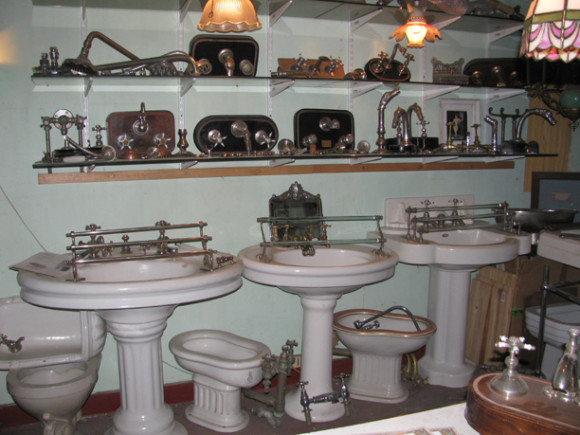
The Marquise de Païva was one of the remarkable courtesans whose history is inseparable from that of the expanding wealth of mid-19th century Paris.
The tale of her life (1819-1884) and of the men she frequented speaks volumes of the history and culture of all of Europe at the time—from Russia to Paris, from Portugal to London, from Algeria to Silesia—while the presence of her bathtub in a corner of an overlooked and dimly lit shop in Paris’s 17th arrondissement offers a curious glimpse at the afterlife of objects of excess and luxury.

Despite her fame, relatively little is known about the woman who came to be known as La Païva Born Esther Lachmann to Polish Jewish refugees in Moscow, the future marquise was first married at age 17 to a French tailor in the Russian capital. But the working-class life was not for Esther; she left behind her husband and son to come to Paris, where she took Thérèse as her first name.
Young, elegant, intelligent, and determined, Thérèse soon charmed Henri Herz, a wealthy pianist who introduced her to musicians and writers and a taste for a life of luxury. Her ambitions as a demimonde led to London, where British lords continued to treat her well. But Paris was where the real action was. She returned to the French capital where, Henri having hit hard times, she soon married a Portuguese nobleman known as the Marquis de Païva.
The newly minted Marquise de Païva, better known as simply La Païva, had now hit the big time. She took the best of the marquis, i.e. his name and his bank account, and pushed the rest, i.e. the man himself, out the door, while remaining married. Her rise follows that of Louis-Napoleon Bonaparte, president from 1848 to 1851 then emperor Napoleon III from 1852 to 1870, though without the fall since she’d encounter greater fortune in the 1870s.
In 1871, she had the marriage to the marquis annulled (he shot himself the following year) and immediately remarried, this time to Prussian Count Henckel von Donnersmark. France may have been defeated by the Prussians in 1871, but La Païva still had the body and mind of a conqueror. The count was 11 years her junior and a cousin to Bismark.
Now countess, though forever remembered as La Païva, she ordered the construction of a mansion on the Champs-Elysées. That mansion, at #25, is one of the few remaining jewels of the avenue. Passersby often miss that landmark building, however, because it’s set back from the more recent buildings on the avenue that have replaced the other mansions that once lined the avenue. It has belonged to The Travellers Club of Paris since 1904, so only members and their guests get to see the interior.
While that mansion was under construction La Païva ordered the decoration of the Chateau de Pontchartrain, 22 miles west of Paris, which the count had given her. The onyx bathtub was ordered for that chateau. The marble comes from an ancient Roman quarry that had recently been reopened in Algeria, then a French colony. It’s said that La Païva took milk baths in the tub, perhaps Champagne baths as well, but it’s doubtful that she got much use of it.
Her Prussian connections certainly increased her fortune—the yellow Donnersmarck diamonds she wore are legendary—but the couple’s contacts within the upper reaches of French government were increasingly strained in the years following the Franco-Prussian War (1870-1871). Some say that she and her husband were accused of spying for the Prussians and eventually invited to leave France. Whatever the reason, they did leave Paris after several years and settled in the counts castles in Silesia, where she died in 1884.
The bathtub now belongs to Nicolas Beboutoff, who was born to a Russian ballerina in Monaco in 1944, was once musician in a balalaika band, and for some time now has specialized in the restoration of pre-1920 plumbing.
How did Mr. Beboutoff come to own the heavy tub and to put it on display among his 19th-century and early 20th-century finds in his shop?
For that curious and distinctly 20th-century European tale you need to stop by his shop at 29-31 rue des Dames in the Batignolles Quarter of Paris’s 17th arrondissement. Best to call first to make an appointment: 01 43 87 88 00. Yes, the tub is for sale. At this writing Mr. Beboutoff is asking 150,000 euros, excluding tax and shipping. See www.sbrparis.com for more about his work.
– GLK
Change of address: Nicolas Beboutoff has since moved his shop (and the famous bathtub) to Cachan, a southern suburb of Paris. The new address is 34 rue Gabriel Peri, 94230 Cachan.

